As you already know, the keto diet demands about 80% healthy fats in its nutritional plan. The most important process during the keto diet is your body’s adaptation to fat metabolism. For your body to properly benefit from ketosis, you need to understand that not all fats are good for your health.
If you want to enjoy the health benefits of a low-carb diet and start a comfortable weight loss process, you need to eat the right types of keto fats. You should avoid synthetic trans fats and processed oils and stick to moderate amounts of saturated fat.

Meat, fatty dairy, nuts, fish, and eggs are perfect sources of fat that you can and should include in your diet. But let’s talk about the perfect addition to a basic keto diet that complements your daily intake of unsaturated fat. It’s about using healthy animal fats and plant oils, which are certainly keto-friendly. What oils are keto? What oils should you avoid during your keto diet? These are tricky questions, but I have all the answers. Let’s figure out all the details together!
How to Choose the Best Oils for Keto?
In general, there are two types of oils:
- extracted from plants without any additional processes by squeezing the pulp;
- extracted from seeds poor in oil using refining processes.
Refined oils contain many polyunsaturated Omega-6 acids, especially linoleic acid, which can trigger inflammation in your body [1]. On the other hand, polyunsaturated Omega-3 fatty acids balance Omega-6s and have positive effects.
The average American consumes too much Omega-6 and often exceeds the number by 10-20 times. To balance the negative effects of Omega-6s in your body, you need to consume enough Omega-3s. A healthy ratio of Omega-3 to Omega-6 is 1:4-1:6, so you need to make up for the lack of Omega-3 in your diet. Healthy keto oils will help you with that.
Should I Count Calories on Keto?
Fatty acids in vegetable oils and animal fat can help boost heart health, reduce fat mass, fight inflammation, lower blood pressure and cholesterol levels. When combined with the nutritional effects of other low-carb foods, they can help you lose weight and get better health. I’ll walk you through the properties of all types of oil and their Omega-3 and Omega-6 ratio [2]. We’ll figure out which ones are keto and why.
Non-Keto Oils and Fats to Avoid
Corn Oil
Corn oil contains many health benefits. Unrefined corn oil has about 85% unsaturated fatty acids and is also rich in saturated ones. It contains vitamins F, B1, E, PP, lecithin, and provitamin A.
Corn oil is especially rich in phytosterols, the plant-based version of cholesterol. As a result, one of the benefits of corn oil is lowering cholesterol levels. Phytosterols block the absorption of cholesterol in the intestines, which lowers total cholesterol and LDL cholesterol levels.
Corn oil fatty acids ratio:
- Saturated fats – 13%
- Monounsaturated fats – 29%
- Omega-9 fatty acids – 27%
- Polyunsaturated fats – 58%
- Omega-3 fatty acids – 1%
- Omega-6 fatty acids – 57%.
Summary
Large amounts of phytosterol increase the risk of heart disease. Besides, corn oil contains 57% linoleic acid, making it one of the worst cooking oils for regular use.

Canola Oil
Canola oil has essential amino acids, which are not synthesized in the human body – linoleic and linolenic. In addition, it contains many vitamins E and A – natural antioxidants that protect cells from damage by oxygen radicals. In addition, canola oil contains many B vitamins and microelements: calcium, copper, manganese, magnesium, and zinc.
However, canola oil contains erucic acid, which is impossible for the body’s enzymes to break down. Therefore it accumulates in tissues and slows down cell growth. Also, erucic acid leads to disturbances in the work of the cardiovascular system, and can cause cirrhosis and infiltration of skeletal muscles.
Canola oil fatty acids ratio:
- Saturated fats – 7%
- Monounsaturated fats – 61%
- Omega-9 fatty acids – 60%
- Polyunsaturated fats – 32%
- Omega-3 fatty acids – 11%
- Omega-6 fatty acids – 21%.
Summary
The harm of canola oil is caused by sulfur-containing organic compounds that have toxic properties. They negatively affect the thyroid gland and other organs and give the oil a bitter taste. For these reasons, I recommend that you avoid canola oil on your nutrition.
Palm Oil
Palm oil is rich in tocopherol and carotenoid. These substances with powerful antioxidant properties can fight free radicals that are harmful to health and cause premature aging. Thanks to provitamin A, palm oil can be beneficial for your vision. Vitamin E allows you to increase muscle mass quickly. In addition, it has a beneficial effect on sexual function. Plant-based natural analogs of coenzyme Q10 promote the supply of additional oxygen to the body.
6 Keto Food Cravings and High-Fat Alternatives
However, almost all of these substances are found in unrefined palm oil. The refining process deprives it of these essential biological substances.
Palm oil fatty acids ratio:
- Saturated fats – 51%
- Monounsaturated fats – 39%
- Omega-9 fatty acids – 39%
- Polyunsaturated fats – 10%
- Omega-3 fatty acids – 0%
- Omega-6 fatty acids – 10%.
Summary
Unsaturated fatty acids are very beneficial for the body. However, palm oil does not contain valuable Omega-3, and it contains too much Omega-6. Therefore, regular consumption of palm oil leads to an imbalance of fatty acids and negatively affects your health.

Soybean Oil
Soybean oil contains linolenic, stearic, palmitic acids, vitamin B4, E1, and useful minerals. It is necessary to improve the brain’s functioning, prevent cancer, and lower blood cholesterol levels. Also, the use of this oil normalizes the metabolic process in the body and fights against atherosclerosis.
It is not recommended to consume soybean oil in large quantities for people suffering from allergic reactions to soy. Regular consumption of soybean oil can lead to obesity. In addition, soybean oil can harm pregnant women since it contains a large number of isoflavones.
Soybean oil fatty acids ratio:
- Saturated fats – 15%
- Monounsaturated fats – 23%
- Omega-9 fatty acids – 23%
- Polyunsaturated fats – 62%
- Omega-3 fatty acids – 8%
- Omega-6 fatty acids – 54%.
Summary
And while the proportion of Omega-3 to Omega-6 is balanced, soybean oil contains a large amount of Omega-6, which can harm your health. That’s why it is better to avoid it during the keto diet.
Safflower Oil
Safflower oil contains up to 80% monounsaturated fatty acids. These are essential acids that are needed for the normal functioning of the body. They help cells renew, give elasticity to blood vessels, and help maintain good health.
Common safflower oil has up to 14% oleic acid in the total composition. However, in high oleic safflower oil, the proportions of acids are opposite: about 80% oleic and up to 14% linoleic.
In addition, it contains a large amount of vitamins E and K. It helps prevent oncology diseases and normalizes blood sugar levels. Safflower oil also prevents the development of diseases such as atherosclerosis and positively affects the body’s immune system.
Safflower oil fatty acids ratio:
- Saturated fats – 8%
- Monounsaturated fats – 77%
- Omega-9 fatty acids – 76%
- Polyunsaturated fats – 15%
- Omega-3 fatty acids – 1%
- Omega-6 fatty acids – 14%.
Summary
Refined safflower oil may be the worst vegetable oil you can use for regular cooking. It contains a large amount of linoleic acid associated with all the problems you have already read about above. In addition, it is unstable when cooked, lacking in nutrients, and increases the risk of inflammation and heart disease. If you want to benefit from safflower oil, choose unrefined cold-pressed oil as a rare addition to your diet.
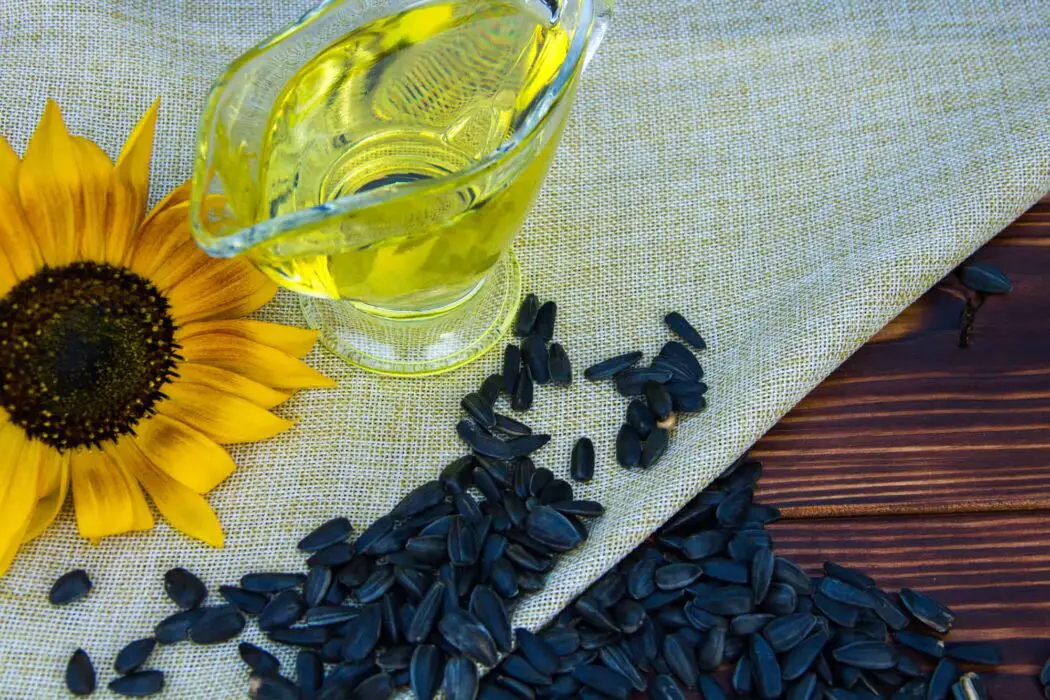
Sunflower Oil
Unrefined sunflower oil contains fatty acids necessary for the functioning of the nervous and circulatory systems. It also has vitamins: A (for vision), D (for skin and bones), a small amount of vitamin K and B4, phytosterols, choline. Besides, sunflower oil is rich in tocopherol, which is an essential antioxidant. Cold-pressed unrefined sunflower oil contains more vitamin E than other vegetable oils.
Nutritionists have long argued whether sunflower oil is useful or harmful, and they still cannot give a definite answer. However, one thing is known for sure. When heated, especially when repeatedly heated, carcinogenic substances are produced. Therefore, you should avoid overusing fried foods and wash the pan after each use of sunflower oil.
Sunflower oil fatty acids ratio:
- Saturated fats – 12%
- Monounsaturated fats – 16%
- Omega-9 fatty acids -15%
- Polyunsaturated fats – 72%
- Omega-3 fatty acids – 1%
- Omega-6 fatty acids – 71%.
Summary
When frying, refined sunflower oil releases aldehydes, which provoke inflammatory reactions, cause cardiovascular and gastrointestinal diseases and increase cancer risk. In addition, it contains huge amounts of Omega-6 and minor traces of Omega-3, which leads to an imbalance in fatty acids, accelerates the aging process, and increases the risk of cancer.
Grapeseed Oil
Grape seed oil is used in cooking for dressing salads and other cold dishes. Extracts from garlic, rosemary, and other spices are also prepared on its basis. However, it is only beneficial when raw. Frying food in this oil is not recommended as the polyunsaturated acids create harmful compounds.
Need Keto Motivation? The Best Tips for Your Keto Lifestyle
The grapeseed oil contains substances that provide high antioxidant activity. This oil has an antiplatelet effect by preventing blood clots. In addition, grapeseed oil slows down the development of neoplastic skin diseases. Also, it weakens the effect of ultraviolet radiation.
It also contains proanthocyanidins, which, in combination with calcium, have a beneficial effect on bones and joints. In addition, proanthocyanidins may have positive effects on cognitive function and help prevent Alzheimer’s disease.
However, all of these beneficial properties apply only to unrefined cold-pressed grapeseed oil.
Grapeseed oil fatty acids ratio:
- Saturated fats – 9%
- Monounsaturated fats – 16%
- Omega-9 fatty acids -16%
- Polyunsaturated fats – 75%
- Omega-3 fatty acids – 1%
- Omega-6 fatty acids – 74%.
Summary
As you can see, this oil contains too much Omega-6 and almost no Omega-3, which is not suitable for a regular diet. Also, grapeseed oil is not suitable for heat treatment because fatty acids are converted into dangerous compounds under the influence of high temperatures. If you want to benefit from grapeseed oil, you can occasionally add it to salads, but remember to balance the Omega-6s in your diet.
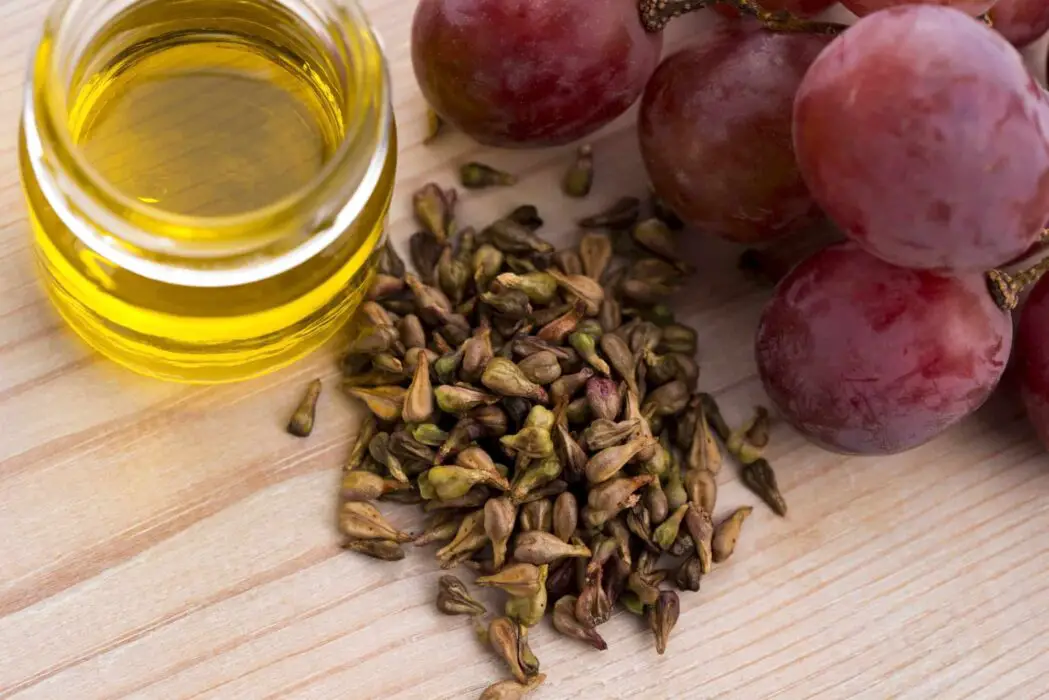
Cottonseed Oil
Cottonseed oil contains a large amount of tocopherol, monounsaturated, polyunsaturated acids, and phytosterol. As a result, it thins the blood and reduces the risk of cardiovascular disease. It also lowers blood pressure due to the content of fatty acids. They dilate blood vessels, prevent them from clogging, and ensure good blood circulation.
Also, cottonseed oil prevents fatty liver with choline, which improves lipid balance. Valuable acids and vitamins stimulate the brain, reduce the risk of neurological diseases, and increase stress resistance.
Cottonseed oil rarely causes allergies. However, people who are prone to diarrhea and have frequent bowel disorders should consult a doctor first.
Cottonseeds oil fatty acids ratio:
- Saturated fats – 27%
- Monounsaturated fats – 19%
- Omega-9 fatty acids – 19%
- Polyunsaturated fats – 54%
- Omega-3 fatty acids – 0%
- Omega-6 fatty acids – 54%.
Summary
Given the proper balance of fatty acids, it can be concluded that cottonseed oil is not a healthy choice due to its high Omega-6 content. Besides, it does not contain Omega-3, so you should take it occasionally, supplementing with foods high in Omega-3 on your menu. I also want to note that this oil is not suitable for cooking.
Peanut Oil
Peanut oil strengthens the immune system’s defenses and helps resist viral infections in the cold season. It has a therapeutic effect on the organs of the digestive tract, especially the gallbladder. Peanut oil has wound healing and anti-inflammatory properties. It is also useful for gastritis, reducing the severity of symptoms and protecting the inflamed mucosa from the aggressive effects of gastric juice.
Peanut oil stabilizes blood pressure and does not affect blood sugar levels. In addition, it has a detoxifying effect, removes toxic substances from the liver, and prevents cirrhosis. It also has a beneficial effect on the central nervous system and can balance the emotional state.
Peanut oil fatty acids ratio:
- Saturated fats – 19%
- Monounsaturated fats – 48%
- Omega-9 fatty acids – 47%
- Polyunsaturated fats – 33%
- Omega-3 fatty acids – 0%
- Omega-6 fatty acids – 33%.
Summary
Peanut oil is rich in linoleic acid, so excessive consumption increases the risk of heart disease, diabetes, and liver disease. On the other hand, it contains a sufficient amount of vitamin E, which is beneficial for health. However, I recommend you healthier sources of vitamin E, such as avocado oil or flaxseed oil.

Sesame Seed Oil
Sesame oil has a rich, delicate flavor with nutty notes. This oil has a medium-high smoke point, which means it can reach high enough temperatures before burning. Sesame oil is rich in calcium, magnesium, iron, phosphorus, copper, manganese, and thiamine. This oil contains biologically active substances sesamol and sesaminol. These are antioxidants that help prevent cell damage caused by free radicals. There are also sesamin and sesamolin, which belong to the class of lignans with anti-inflammatory properties.
How Long Does it Take to Enter Ketosis? 9 Tips to Do it Quickly
Sesame oil contains phytin, which restores and normalizes the mineral balance in the body. It also has phytosterol, which reduces the risk of infectious diseases and atherosclerosis. In addition, the presence of protein and lecithin, involved in antioxidant processes, ensures the natural balance of the skin. High-quality sesame oil also contains essential sterols and squalene.
Sesame seed oil fatty acids ratio:
- Saturated fats – 16%
- Monounsaturated fats – 40%
- Omega-9 fatty acids – 40%
- Polyunsaturated fats – 44%
- Omega-3 fatty acids – 3%
- Omega-6 fatty acids – 41%.
Summary
As you can see, sesame oil does not have a balanced composition of fatty acids, so you should not eat it often. However, you can add some unrefined sesame oil to salads and sauces for health benefits.
Keto Oils and Fats
While most of the oils are not a healthy choice, you still have great options that contain a healthy balance of fatty acids. The high content of Omega-3s helps eliminate the negative effects of Omega-6s, so add them to your menu regularly. These keto oils will help you get healthy fats during your diet and benefit your health.
Coconut Oil
Coconut oil contributes to the healthy functioning of the thyroid gland, endocrine system, and metabolism. In addition, it reduces the stress on the pancreas and promotes increased calorie burning, which helps overweight people lose weight faster.
MCT oil is produced on the basis of coconut oil. It contains medium-chain triglycerides and differs from ordinary coconut oil in a shorter molecular chain. Due to this, the body processes MCT oil faster. In addition, it goes directly to the liver to produce ketones rather than being deposited in adipose tissue. Thus, the process of losing weight is even more efficient.
Coconut oil has anti-inflammatory, antifungal, and bactericidal effects due to vitamin E and various fatty acids in its composition.
It helps improve the health of the cardiovascular system and prevents the development of atherosclerosis, thrombosis, coronary heart disease, and arterial hypertension. In addition, coconut oil helps to reduce the level of bad cholesterol in the blood and lowers high blood pressure. Vitamin E also reduces the blood viscosity and strengthens the arteries’ walls, preventing blood clots’ formation.
It has a beneficial effect on the functional state of the thyroid gland and reduces the risk of developing diseases in the digestive system. Coconut oil is useful for people with type II diabetes and prevents the development of obesity. It improves the natural production of insulin by the pancreas, activates and accelerates metabolic processes, and helps restore normal blood glucose levels in diabetes mellitus. In addition, this oil has an antioxidant effect, prevents premature aging, and reduces the risk of developing Alzheimer’s disease.
Coconut oil fatty acids ratio:
- Saturated fats – 92%
- Monounsaturated fats – 6%
- Omega-9 fatty acids -6%
- Polyunsaturated fats – 2%
- Omega-3 fatty acids – 0%
- Omega-6 fatty acids – 2%.
Summary
Coconut oil is my favorite choice for making keto desserts. It is resistant to high temperatures and does not lose its properties when heated. This oil contains very little Omega-6, so don’t hesitate to add it to your keto diet.
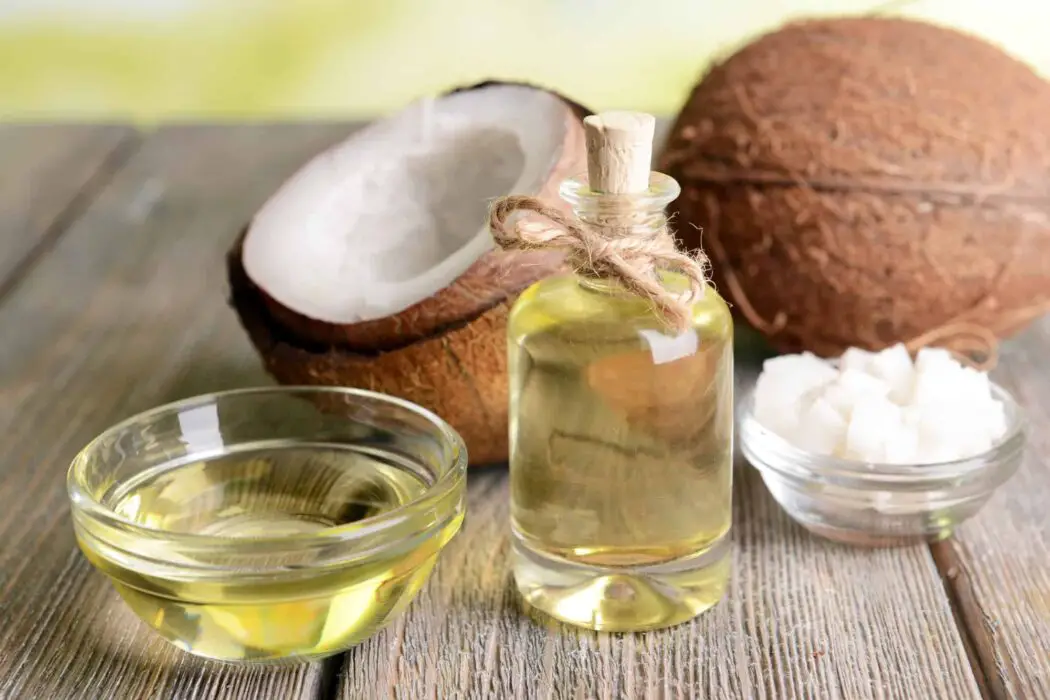
Olive Oil
Today almost everyone knows about the benefits of olive oil. It has a unique composition, which includes many vitamins and minerals, and fatty acids. Due to them, olive oil is considered an essential component of dietary nutrition. Olive oil is a valuable food with a high content of monounsaturated fatty acids and polyphenols, including Omega-9, Omega-3, and Omega-6. Besides, it contains all the vitamins necessary for your body – A, B, C, D, E, F, K.
Here are the main benefits of olive oil for your health:
- Benefits for the large intestine. Olive oil helps strengthen and protect the walls of the large intestine. Also, it helps with constipation.
- Healthy hair, skin, nails, and bones. The oil nourishes and repairs dry skin and brittle hair.
- Strengthening the immune system. The beneficial fatty acids in olive oil support and strengthen your body’s natural barriers.
- Protection of the heart. Olive oil is good for lowering bad cholesterol and protecting your heart.
- Elimination of inflammation. Olive oil has anti-inflammatory properties and helps with muscle and joint pain.
- Normal blood sugar levels. Regular consumption of olive oil decreases blood sugar levels and strengthens the cardiovascular system.
- Brain support. Olive oil contains important and beneficial fatty acids that promote good memory and reduce the risk of Alzheimer’s.
Olive oil fatty acids ratio:
- Saturated fats – 15%
- Monounsaturated fats – 75%
- Omega-9 fatty acids – 75%
- Polyunsaturated fats – 10%
- Omega-3 fatty acids – 2%
- Omega-6 fatty acids – 8%.
Summary
Olive oil contains a harmonious combination of fatty acids, which makes it especially beneficial for your health. However, I do not recommend using it for frying because it loses its unique properties. Instead, I love to season salads with olive oil and use it to make keto mayonnaise and keto hummus.
Avocado Oil
Avocado is the magic food for the keto diet. What about its oil? Avocado oil has powerful antibacterial, nourishing, and regenerating properties. It contains a high concentration of vitamins and trace elements such as vitamins A, E, C, B1, B2, B3, B9, D, fatty acids, lecithin, phytosterols, essential oils, chlorophyll, and squalene. It also has many useful macro-and microelements – potassium, magnesium, phosphorus, iron, calcium, sodium, manganese, zinc, iodine, cobalt, copper, etc. Besides, avocado oil contains a large amount of the antioxidant vitamin E, which has powerful immunoprotective, wound healing, and revitalizing properties.
Carbs in Cauliflower: the Top 11 Health Benefits
Squalene provides the production of sex hormones and has powerful wound healing, antifungal, and antimicrobial properties. It helps to reduce the level of cholesterol in the blood. When interacting with water, it saturates the tissues and organs with oxygen. Squalene, vitamins E and C are effective immunostimulants and can reduce the result of the harmful effects of free radicals, carcinogens, and radiation.
Avocado oil is also high in the beneficial antibacterial substance chlorophyll. It has a useful effect on the respiratory, cardiovascular, endocrine, digestive systems, relieves irritation of the mucous membrane, and accelerates the healing process. In addition, it prevents the formation of kidney and bladder stones, helps to cleanse the human body of toxins effectively.
Lecithin plays a key role in the healthy functioning of the cardiovascular, central, and peripheral nervous systems. It participates in the synthesis of hormones necessary for the proper functioning of the liver, pancreas, and reproductive system and significantly improves the absorption of vitamins A and E.
Avocado oil fatty acids ratio:
- Saturated fats – 14%
- Monounsaturated fats – 71%
- Omega-9 fatty acids -67%
- Polyunsaturated fats – 15%
- Omega-3 fatty acids – 3%
- Omega-6 fatty acids – 12%.
Summary
Avocado oil has a healthy mix of Omega-3 and Omega-6, so eating it regularly will benefit your health. Add it to salads, make baked fish sauces, and use it in the keto bakery.

Flaxseed Oil
Flaxseed oil benefits your health due to the optimal balance of useful components. Its chemical composition contains unsaturated fatty acids (Omega-3, Omega-6, Omega-9), saturated fatty acids, vitamins A, E, K, B, F, minerals (iron, calcium, phosphorus, zinc, magnesium), and natural antioxidants (sesamol, phytoestrogens, tocopherols).
Minerals are involved in building bone tissue, strengthening cell membranes, and normalizing metabolic processes. Flaxseed phytoestrogens have a powerful antioxidant effect and antitumor activity. However, you should know that this oil has unique healing properties only when cold-pressed.
Flaxseed oil has unique medicinal properties:
- serves as the prevention of atherosclerosis;
- prevents the formation of cholesterol plaques in blood vessels;
- normalizes lipid metabolism;
- reduces the risk of developing hypertension, heart attack, stroke;
- improves the functioning of the digestive tract;
- stimulates the work of the biliary system, improves the function of the gallbladder;
- helps to restore hormonal balance;
- prevents the formation of free radicals that trigger malignant processes;
- helps to preserve youth, and improve the condition of the skin and hair;
- strengthens the immune system.
Flaxseed oil increases resistance to stress, strengthens the nervous system, improves concentration, and also helps people to maintain a clear mind and good memory. In addition, regular intake of flaxseed oil normalizes intestinal motility, relieves constipation, and removes harmful and toxic substances from the body.
Flaxseeds oil fatty acids ratio:
- Saturated fats – 9%
- Monounsaturated fats – 16%
- Omega-9 fatty acids – 16%
- Polyunsaturated fats – 75%
- Omega-3 fatty acids – 57%
- Omega-6 fatty acids – 18%.
Summary
Flaxseed oil is unique in its balance of fatty acids, as it contains three times more Omega-3 than Omega-6. Therefore, eating flaxseed oil regularly will help you balance excess Omega-6s from other foods and will be a great addition to your keto diet. However, you should be aware that this oil loses all its beneficial properties during heat treatment, so you should only eat it raw.
Hazelnut Oil
Hazelnut oil is characterized by a high content of oleic, palmitic, linoleic, and stearic acids and a sufficient amount of vitamins E, PP, B, and C. It contains a lot of tocopherols and carotenoids, phosphorus, copper, iron, and calcium, as well as sterols.
It contains a lot of valuable vitamins – E, PP, C, and group B. Tocopherol, acting together with minerals, maintains normal blood pressure, and heals the bones. It replenishes the reserves of important minerals such as iron, calcium, zinc, sodium, phosphorus, and copper. In addition, monounsaturated fatty acids – linoleic, palmitic, and stearic acids – positively affect the body.
The main beneficial properties of hazelnut oil:
- A good metabolism and slowing down aging processes due to high vitamin content. It has a high choline content and is also rich in ascorbic acid, retinol, and a group of B vitamins.
- The support of the circulatory system, bone tissue, and digestion is possible due to trace elements. They control the activity of the heart muscle, brain and also regulate metabolism.
Hazelnut oil fatty acids ratio:
- Saturated fats – 9%
- Monounsaturated fats – 76%
- Omega-9 fatty acids – 72%
- Polyunsaturated fats – 15%
- Omega-3 fatty acids – 2%
- Omega-6 fatty acids – 13%.
Summary
And while hazelnut oil also contains Omega-6 fatty acids, it has an adequate balance of Omega-3s. Therefore, it is safe to eat during a keto diet. Hazelnut oil is also not suitable for frying, as it loses all its beneficial properties when exposed to high temperatures.
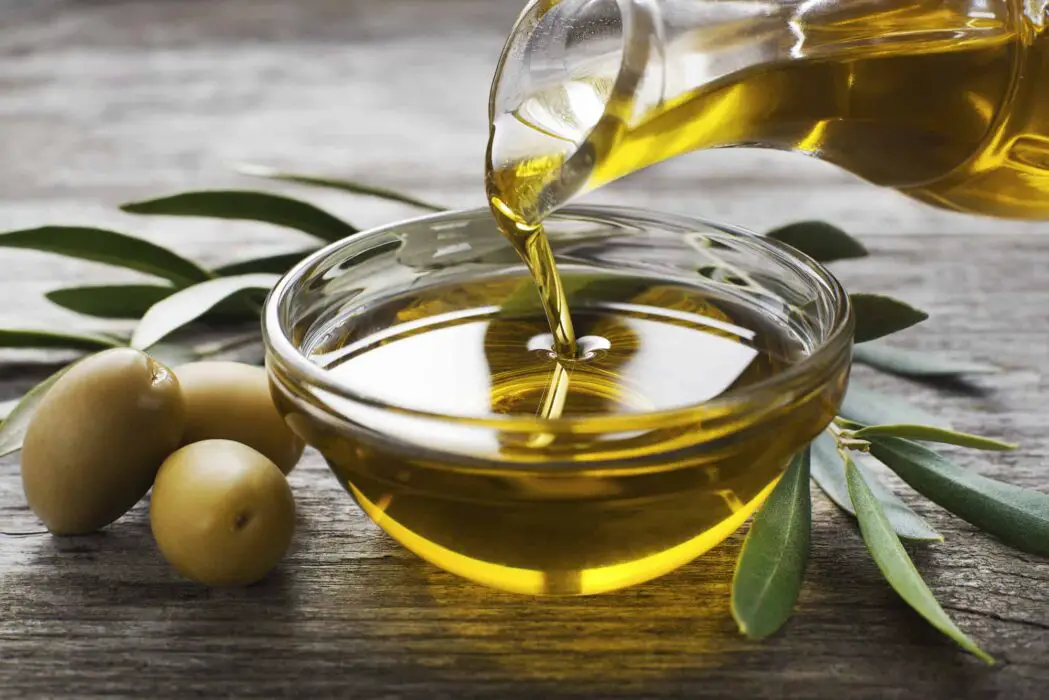
Walnut Oil
Among all oils, it is considered the leader in the content of vitamin E. In addition, it contains iodine, cobalt, phosphorus, copper, zinc, magnesium, and iron. Walnut oil also contains vitamins that benefit the skin – B, PP, A, K, C.
It contains natural compounds and fatty acids that are irreplaceable for the body. In addition, it has the perfect ratio of Omega-3 to Omega-6.
Keto-Friendly Nuts: What to Eat and What to Avoid
The main beneficial properties of walnut oil:
- Digestive system. The oil is used in the complex treatment of cholecystitis, colitis, ulcers. It enhances bile secretion, increases the elasticity of the bile ducts, and restores liver cells.
- Omega-3 stimulates the brain, improves memory, strengthens the nervous system, and protects the body from stress.
- Respiratory system. The walnut oil improves the immune system, increasing the body’s resistance to respiratory diseases.
- The genitourinary system. Walnut oil is used for treating kidneys disorders and inflammatory diseases of the bladder.
- Cardiovascular system. Walnuts reduce the risk of heart disease and prevent the development of atherosclerosis and thrombophlebitis. Besides, this oil stimulates the process of hematopoiesis and is used to treat varicose veins.
- Walnut oil improves skin condition, prevents the appearance of wrinkles, has a healing and regenerating effect.
Walnut oil fatty acids ratio:
- Saturated fats – 10%
- Monounsaturated fats – 22%
- Omega-9 fatty acids – 22%
- Polyunsaturated fats – 68%
- Omega-3 fatty acids – 14%
- Omega-6 fatty acids – 54%.
Summary
Walnut oil is also not suitable for frying, as it becomes bitter when exposed to heat. However, it has a healthy balance of fatty acids, making it great for regular consumption during a keto diet.
Butter
Butter has a rich composition: tocopherols, carotene, and vitamin D. Tocopherols are antioxidants that protect cells from free radicals and slow down the body’s aging. In addition, vitamin D is important for the absorption of calcium and strong immunity. Therefore it must also be obtained from food.
The main beneficial properties of butter:
- Healthy hair and skin. Butter contains vitamins A, B, C, D, E, which are very important for the health and beauty of your hair and skin.
- Healthy vessels. The level of cholesterol is very important for healthy blood vessels. Besides, butter reduces the harm of foods that raise blood cholesterol levels.
- Healthy stomach. Butter should definitely be included in the menu for those who have chronic diseases of the gastrointestinal tract. Vitamin A will help heal wounds and reduce inflammation. In addition, butter acts as a natural ointment, covering the walls of the stomach.
- Additional energy. Butter provides extra energy and warmth, just like any animal fat that comes with food.
- Good mood. Milk fat contains a lot of tryptophan, an amino acid that promotes the production of serotonin. So butter can be safely called one of the components of a good mood. Besides, serotonin reduces sugar cravings and improves sleep.
- Increased efficiency. Milk fats help brain cells to regenerate, speed up thinking processes, and increase focus.
Butter fatty acids ratio:
- Saturated fats – 68%
- Monounsaturated fats – 28%
- Omega-9 fatty acids – 28%
- Polyunsaturated fats – 4%
- Omega-3 fatty acids – 1%
- Omega-6 fatty acids – 3%.
Summary
Butter is based on saturated fats and contains small amounts of Omega-3 and Omega-6. However, they are properly balanced, and this allows you to enjoy the health benefits of butter without harming your health.
Butter is a great choice for the keto diet due to its delicate flavor and versatility in cooking. I can eat a slice of butter and cheese if I need to supplement the fat in my keto diet. It is great for stewing and making a variety of keto pancakes, but it can burn when fried at high temperatures.

Ghee
Ghee is obtained by melting butter. It is different in molecular structure from other animal fats. When reheating, harmful combinations, milk proteins, sugar, and water are removed from the butter, but all vitamins and fatty acids remain stable. Milk fat contains more than 140 types of fatty acids. In addition, it is rich in phosphatide, which prevents vascular sclerosis, promotes proper metabolism of fats, and prevents them from being deposited in the liver.
Ghee has several benefits compering to butter:
- It does not contain lactose; therefore, it can be consumed by people with lactose intolerance.
- Fatty acids in Ghee have a short chemical chain, so they are better absorbed by the body;
- Ghee has no casein protein; therefore, it is harmless for people with high cholesterol.
One of the main advantages of Ghee is that it does not burn when frying. Ghee is composed primarily of short-chain saturated fatty acids that do not oxidize at room temperature or when fried. Therefore, it is considered to be the most beneficial for cooking, promoting better food absorption.
The healing properties of Ghee make it useful for:
- increasing immunity;
- slowing down the action of free radicals;
- improving digestion;
- normalization of metabolic processes;
- removal of toxins;
- enrichment of the body with vitamins A, E, fatty acids;
- stimulation of mental activity.
Ghee fatty acids ratio:
- Saturated fats – 65%
- Monounsaturated fats – 25%
- Omega-9 fatty acids -25%
- Polyunsaturated fats – 5%
- Omega-3 fatty acids – 2%
- Omega-6 fatty acids – 3%.
Summary
I consider Ghee to be one of the best keto fats. It has the most delicate taste and can take very high temperatures. Ghee is perfect for frying vegetables, steaks, fish, and cooking eggs. In addition, its balance of fatty acids is beneficial to your health so that you can consume Ghee without restriction during your keto diet.
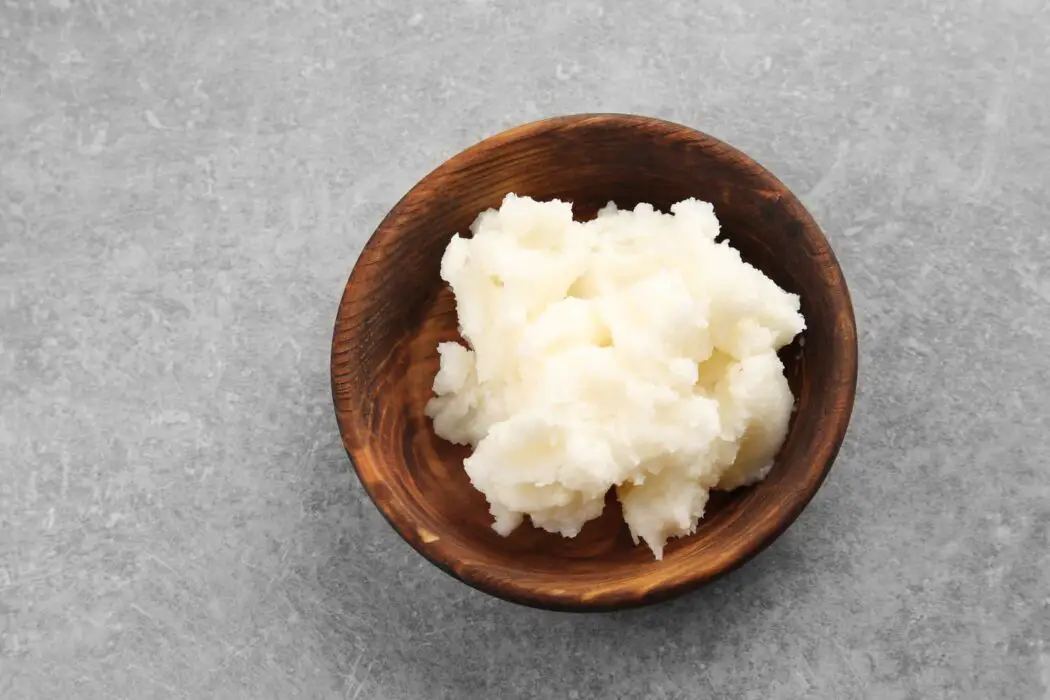
Animal Fats
Nutritionists have condemned animal fats throughout the past century. However, many studies have proven the benefits of these fats for your health. Various animal fats that are good for you during a keto diet include pork fat, lamb fat, beef tallow, duck fat, fish fat, lard, and other parts of animal fat.
Animal fat gives you a feeling of fullness for long hours. It makes food taste full, sending satiety signals to the brain. Besides, it contains carotene and lecithin, vitamins A, E, and D necessary for the body’s normal functioning.
Carnivore FAQ: Foods to Eat and to Avoid
Animal fats are one of the main suppliers of energy. They make our skin smooth and soft and give our hair a healthy, radiant look. Animal fats are especially important during the keto diet because they serve as an almost irreplaceable building material and a source of fatty acids, keeping you satisfied for a long time.
Animal fats fatty acids ratio:
- Saturated fats – 45-55%
- Monounsaturated fats – 41-46%
- Omega-9 fatty acids – 38%
- Polyunsaturated fats – 4-9%
- Omega-3 fatty acids – 0-2%
- Omega-6 fatty acids – 3-7%.
Summary
While on a keto diet, you will get enough animal fats from fatty meats, fish, and poultry. You can also use pork fat or duck fat to make scrambled eggs or sauté vegetables. However, I want to point out that you shouldn’t overeat animal fats if your goal during the keto diet is weight loss.

Conclusion
As you can see, the selection of oils for the keto diet is quite varied. The best keto oils include olive oil, avocado oil, coconut oil, and animal fats. Each type of fat has its own health benefits, so diversify your diet by adding different options.
The main rule for choosing a healthy oil for any diet is the balance of Omega-3 and Omega-6 fatty acids, which should be 1:4-1:6. Too much Omega-6 can negatively affect your health, so opt for oils that contain enough Omega-3s. Read the labels on processed foods to avoid harmful oils. Your keto diet should be complete and balanced so that you can enjoy all the benefits for your health.
Sources:
- Philip C Calder. Polyunsaturated fatty acids and inflammation. Published: July 10, 2006 (https://doi.org/10.1016/j.plefa.2006.05.012)
- How to Optimize Your Omega-6 to Omega-3 Ratio (2018, healthline.com)